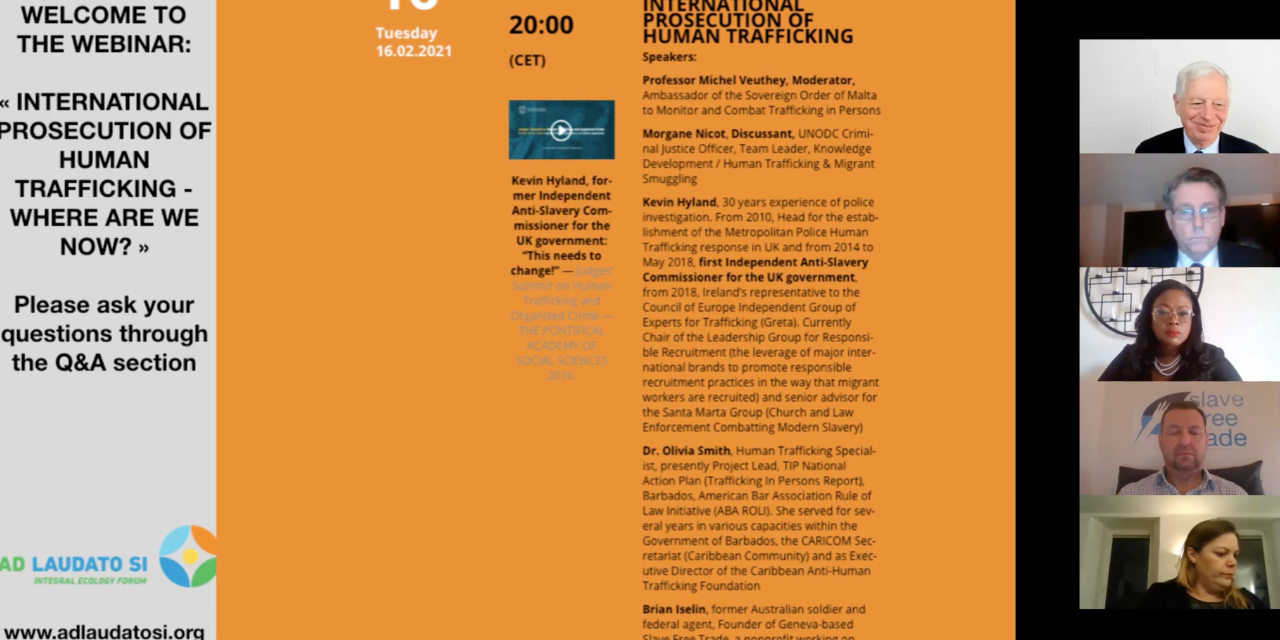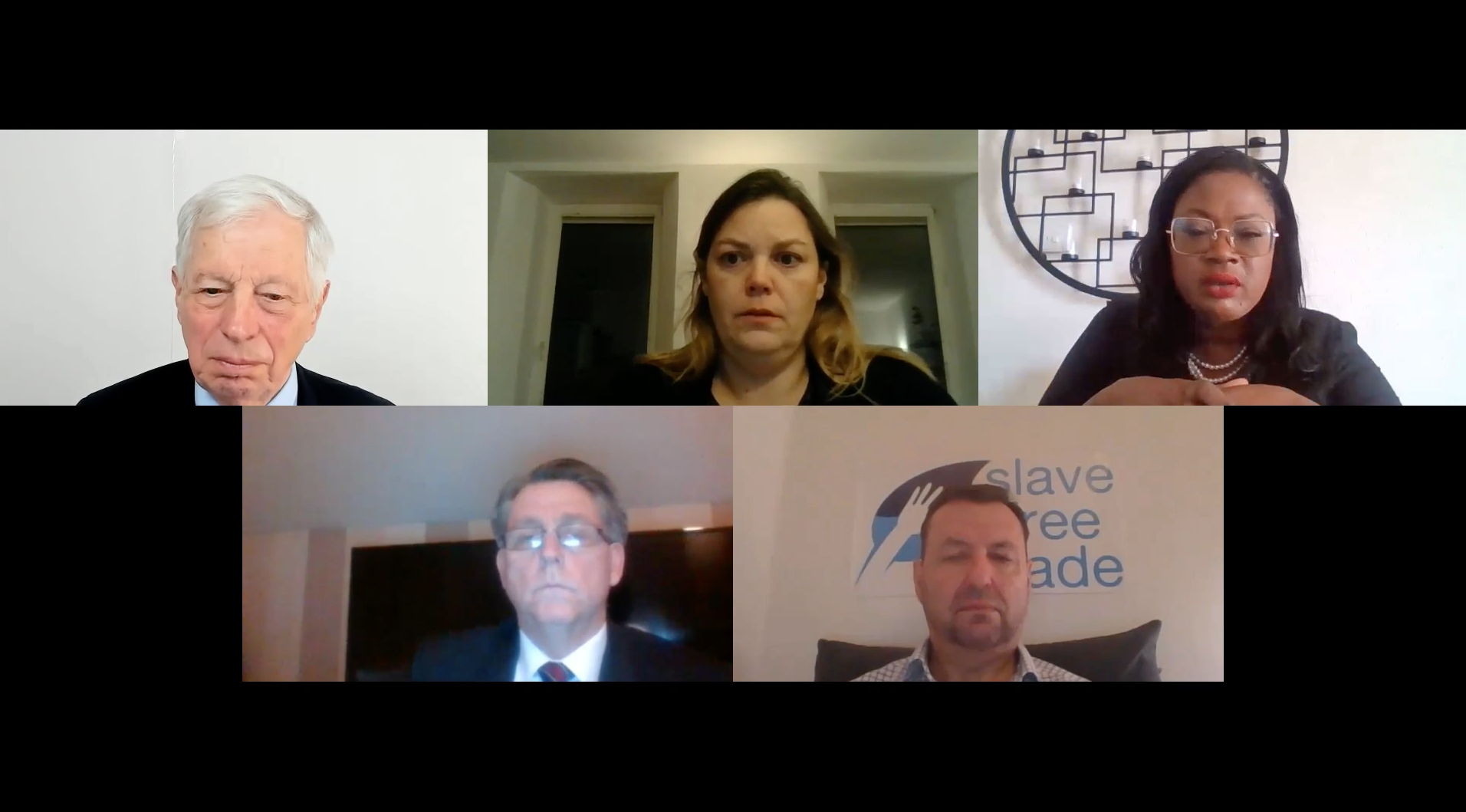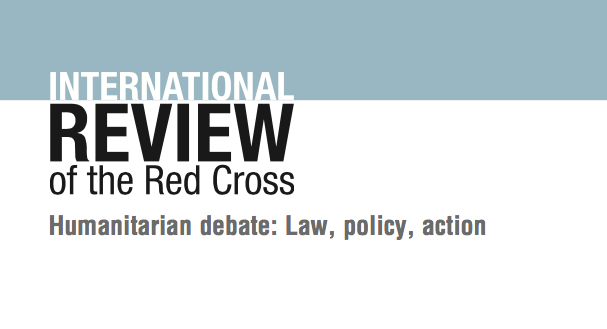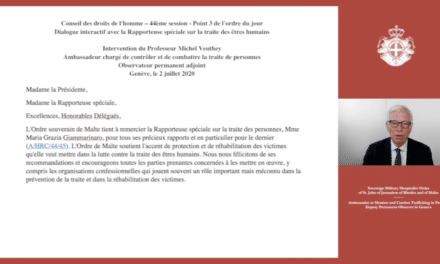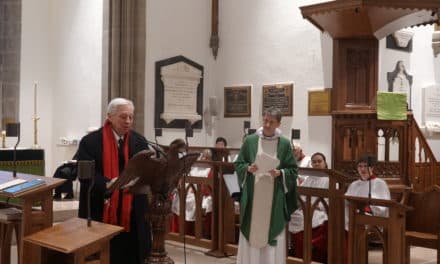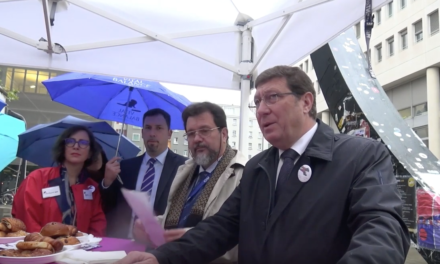Your are welcome to watch our first On-Demand Video Webinar on “International Prosecution Of Human Trafficking — Where Are We Now?”.
The Ambassador of the Order of Malta to monitor and combat trafficking in persons organizes a series of 3 webinars on the international prosecution of human trafficking. This series of 3 webinars will assess the implementation of this treaty, raise awareness on the need to effectively prosecute traffickers, and promote action at the international, regional and national levels.
The first webinar took place on Tuesday, the 16th of February.
This webinar did focus on the present situation, taking stock of the implementation of the Palermo Protocol, 20 years after its adoption.
The webinar highlighted how difficult it is today to prosecute human trafficking criminals: according to Kevin Highland, first Independent Anti-Slavery Commissioner for the UK government, less than one in 1,250 trafficking cases is currently prosecuted. According to him, it is time to put in place at the international level, a plan on the same scale as the one being launched to fight global warming. Very few resources are devoted by governments to fight trafficking, which affects more than 45 million people worldwide.
Speakers:
Professor Michel Veuthey, Moderator, Ambassador of the Sovereign Order of Malta to Monitor and Combat Trafficking in Persons
Morgane Nicot, Discussant, UNODC Criminal Justice Officer, Team Leader, Knowledge Development / Human Trafficking & Migrant Smuggling
Kevin Hyland, 30 years experience of police investigation. From 2010, Head for the establishment of the Metropolitan Police Human Trafficking response in UK and from 2014 to May 2018, first Independent Anti-Slavery Commissioner for the UK government, from 2018, Ireland’s representative to the Council of Europe Independent Group of Experts for Trafficking (Greta). Currently Chair of the Leadership Group for Responsible Recruitment (the leverage of major international brands to promote responsible recruitment practices in the way that migrant workers are recruited) and senior advisor for the Santa Marta Group (Church and Law Enforcement Combatting Modern Slavery)
Dr. Olivia Smith, Human Trafficking Specialist, presently Project Lead, TIP National Action Plan (Trafficking In Persons Report), Barbados, American Bar Association Rule of Law Initiative (ABA ROLI). She served for several years in various capacities within the Government of Barbados, the CARICOM Secretariat (Caribbean Community) and as Executive Director of the Caribbean Anti-Human Trafficking Foundation
Brian Iselin, former Australian soldier and federal agent, Founder of Geneva-based Slave Free Trade, a nonprofit working on leveraging the might of the blockchain to rid the world of slave labor
February 16, 2021 Webinar Report
WHERE DO WE STAND? — INTERNATIONAL CRIMINAL PROSECUTION OF HUMAN TRAFFICKING
PARTICIPANTS
- Michel Veuthey
- Kevin HYLAND
- Olivia SMITH
- Brian ISELIN
- Morgane NICOT
INTRODUCTION — Michel VEUTHEY
- This webinar is the first of 3 webinars on the international prosecution of human trafficking.
- It focuses on the implementation of the Palermo Protocol, 20 years after its adoption.
Kevin HYLAND
- Like the fight against global warming, we must all commit to the fight against human trafficking on a global scale.
- Findings:
- Today, there are 40 million people and 151 million children in forced labor or working in unacceptable conditions.
- The first legislation concerning these crimes dates back to 326 BC. This is not a new phenomenon.
- This human trafficking is a real business, generating 150 billion dollars a year.
- Many commitments have been made: UN protocol, Council of Europe, EU directives, OSCE commitments and guidelines, UN human rights, SDG, G20, G7, legislation in most countries of the world. But the crime continues.
- Legal proceedings are necessary but not sufficient to stop the phenomenon.
- They are very limited: 9548 convictions against 40 million victims. Only 498 convictions for forced labor. 99.98% impunity rate.
- Conviction times are particularly long compared to other crimes: immigration problem, wrong decision-maker involved (e.g. in the UK, decisions are taken by the Home Office, even though it does not concern it.
- Proposals:
- We also need to think about demand in business models.
- There is a need for strict control over the supply chain. Ex. Boohoo company in Leicester or the manufacture of surgical gloves in Malaysia.
- At the national level: There is a need for partnerships: civil society, NGOs, police, official bodies (health, housing, education, transport) with :
- Holistic thinking about what can help the victim
- Clarification of roles: the police have the technical means, but they must cooperate with other civil society organizations (including religious congregations).
- a multi-agency approach: courts and labour inspectorates
- The Church has a place in this collaboration:
- Santa Marta group (formed by Pope Francis in 2014) with collaboration between police chiefs, bishops and civil society.
- It can offer housing, support.
- It provides services and must therefore be exemplary in its supply chain (cf. Archbishop of Sydney’s approach)
- It can use diplomacy, which it has done by supporting Goal 8 of the SDGs (Sustainable Development Goals), to be achieved by 2030
- In terms of governance, the States must each take their responsibilities with:
- Fiscal, penal, etc. incentives to avoid this traffic
- Strong and transparent procurement systems
- The establishment of a new legal concept: dirty money, i.e. money tainted by modern slavery with incentives not to use it.
- Better control over the internet to prevent trafficking.
- An adjustment of legal tools (1926 Slavery Convention)
- The gathering of international actors (UN, World Bank, World Food Program)
Dr. Olivia SMITH
- Findings: 27 million people enslaved worldwide. The Palermo Protocol was established to prevent, suppress and punish traffickers and to complement the protocols on transnational organized crime.
- Analysis of the TIP Report (TIP Report, Trafficking in Persons Report, US) and :
- This international report is an annual report that outlines the measures governments are expected to take to eliminate human trafficking.
- It classifies 188 countries into 3 levels:
- Level 1: maximum measurement level
- Level 2: Some countries are taking action but are not fully compliant
- Tier 3 Watchlist: some countries are not fully compliant but have made efforts
- Level 3: not really complying
- A tool used globally to negotiate and encourage States to prioritize human trafficking.
- Situation in Central America:
- Impoverished region, gang violence and human trafficking. 3rd largest crime industry in the world. Source of migrants to the US
- Well-established networks in Guatemala, Honduras, El Salvador and Belize (important transit point from Guatemala, Mexico and the US border)
- National and intra-regional routes follow the economic path
- Involvement of criminal gangs but also of individuals and large organizations, immigration services, police.
- Situation in the Caribbean:
- Region with dynamic migration flows, countries of origin, transit and destination.
- Policy initiatives: (2012) with CARICOM countries, (2010) Caribbean Basin Security Initiative, (2020) U.S./Caribbean Multi-Year Strategy
- System Gap:
- Technology: Knowledge of technology but lagging behind those who prosecute traffickers in knowledge of these rapidly evolving systems.
- Legal tools :
- United Nations Convention on Human Trafficking, Prevention Protocols, Extraordinary Declaration of Malaga, Law on the Strengthening of the Commitment of the US and the Northern Triangle, etc.
- BUT national legislations have not yet been reviewed OR no significant actions at national level.
- Lack of knowledge of international law by judges and courts.
- In national legislations, a victim has to prove that he or she was a victim. Very difficult to prove.
- Trafficking remains a silent crime. Real denial that trafficking exists.
- International level:
- Lack of regional strategy: Example of Venezuela with more than 100,000 migrants in the Caribbean countries
- The situation is reinforced by the COVID crisis, with migrants trapped in the Caribbean states and with greater opacity of actions, during the period of confinement.
- National level:
- Strengthen national state legislation
- Need for a victim-centered approach (with empowerment)
- Dealing with public officials
Brian ISELIN:
- At the time of the ratification of the Palermo Protocol in 2000, there was almost no funding to fight human trafficking. Palermo was a hope, a shining light for a moment. In 2021: a global industry has developed.
- Findings:
- Little action other than a preponderance of focus on law enforcement and criminal justice responses. E.g., Australia focused 100% on sexual exploitation, 100% on supply-side measures.
- Budgets have been allocated to awareness campaigns, etc., but without regard to effectiveness.
- Palermo allowed a paradigm shift with the emphasis on human trafficking: a victim can be a victim of child labor, forced labor, slavery or servitude. Great complexity of situations.
- Treaty focused on enforcement, punishment, supply reduction.
- Reflecting on the demand from the observation of other illicit markets:
- Vulnerability factors are not the cause of the market. Just because people are poor before they are trafficked does not mean that poverty is the cause. They are push factors.
- The market remains unchanged no matter what is done with the supply. Police actions against gangs displace trafficking but do not change market dynamics. Insufficient police resources.
- So we have to focus on the demand side, on the slave trade, like what Slave Free Trade does: positive and behavioral solutions, reducing the number of jobs in the world where people are exploited. ( Cf. Human Rights Information Platform)
Morgane NICOT :
- International legal tool:
- Protocol that is 20 years old and completes a collaborative instrument to tackle crimes, especially for law enforcement.
- 147 signatories and 190 participating countries
- For what purpose?
- To fight the crimes they are supposed to face, to solve the problems the victims are facing, to ensure prevention.
- It provides a legal framework to combat impunity. We need several levers.
- It proposes to define common terms, which is not so easy.
- Explain what this crime means, looking at the supply chain (not just the end)
- Recall that it is the responsibility of the States
- Initiate public-private partnerships.
- Findings:
- Gathered many countries around the table, with a more holistic perspective on migration.
- Need for law enforcement but also for civil society
- Impact at national, regional and international level
- UNODC report show the level of criminal justice response. That means: how many people have been identified as victims, how many investigations, etc., and we see that there is more and more detection of various forms of exploitation.
General questions?
- What is the role of the International Criminal Tribunals (ICC) in prosecuting human trafficking cases?
- Combating state-sponsored human trafficking
- Encourage international companies to act, fight corruption, identify victims, etc…
- Very slow processes but ICCs can take exceptional sanctions
- Human trafficking is a transnational crime, so multilateral cooperation must be strengthened while taking into account cultural realities.
- What are the first steps to be taken in the fight against modern slavery?
- Communicate with people with reliable, simple information.
- Dealing with cognitive dissonance: Provide information and then a simple action to take: indicator on the NYC stock market. This helps in purchasing decisions and allows for boycotting certain companies. We need to give simple actions to do that thousands of people can do. This is where action is possible.
- Engage communities and individuals with what they can achieve.
- Need for broad community awareness: education, prevention. Need to address broader development and economic issues
CONCLUSION — Michel VEUTHEY
- In 1997 and 1998, there were two major conventions on the banning of anti-personnel mines and for the ICC.
- These conventions have brought together governments, international organizations, NGOs, national societies and individuals: this is what needs to be done on the subject of human trafficking.

